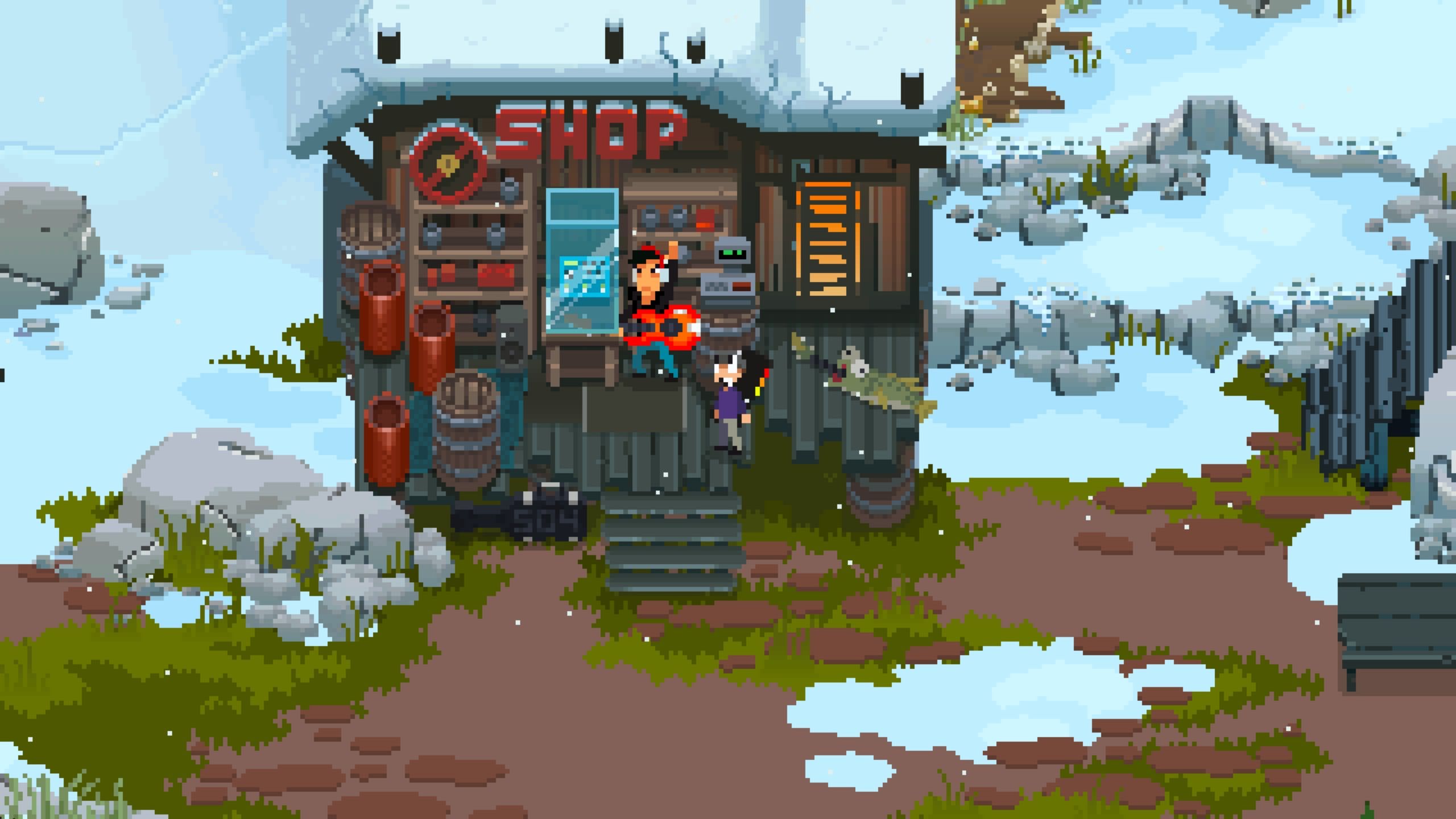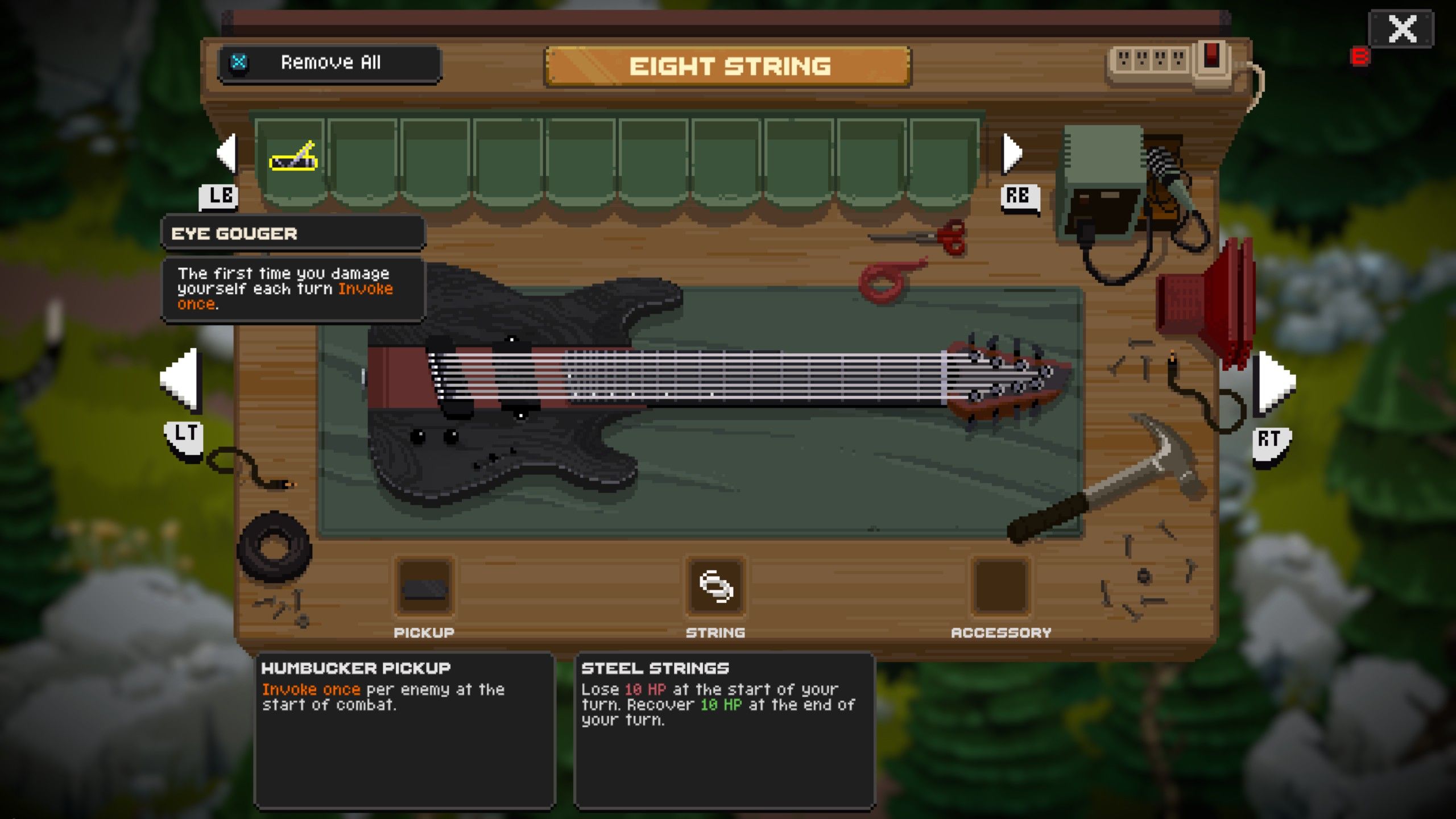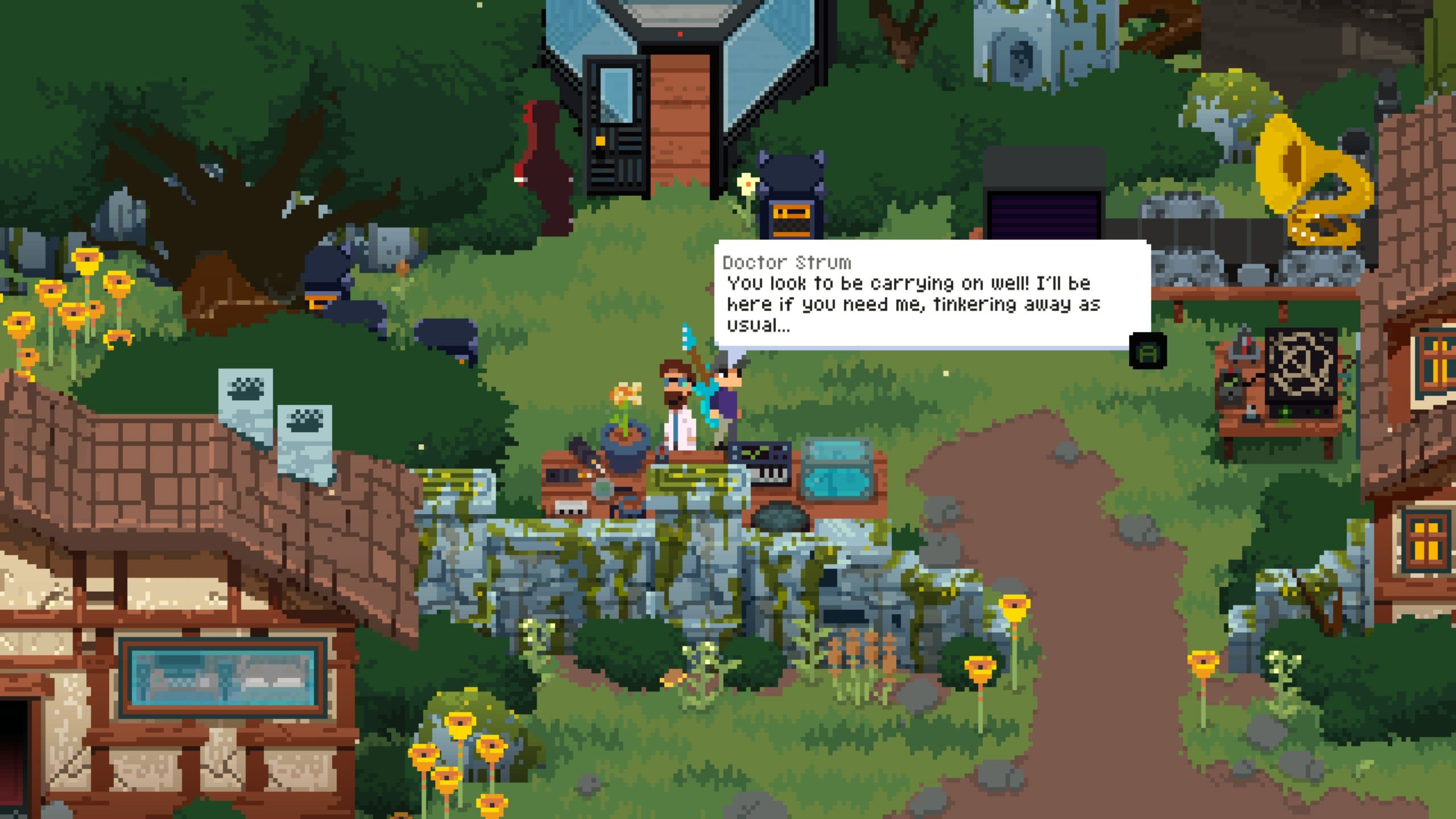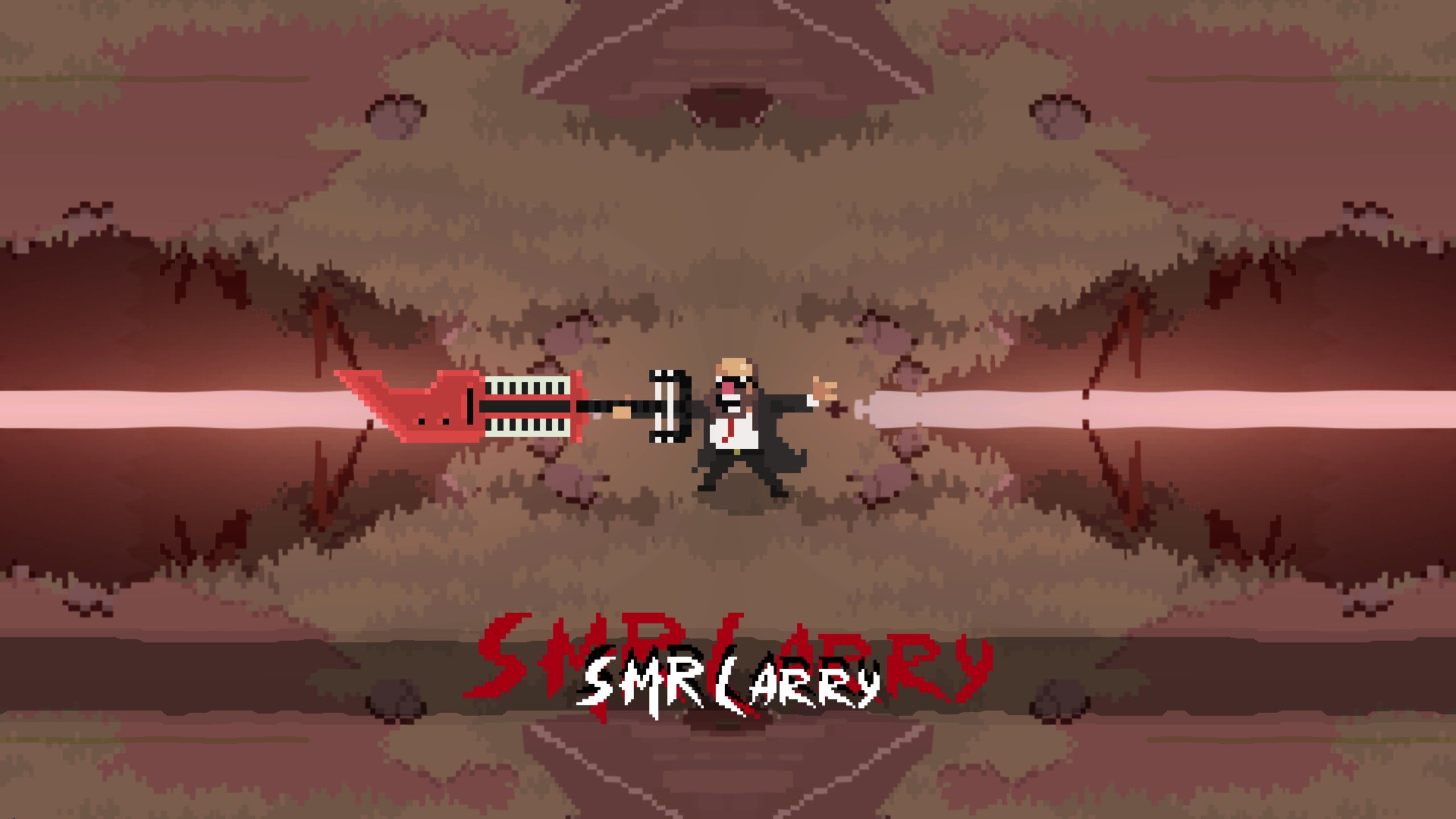If Ritual Studios’ upcoming rock-and-roll RPG Fretless – The Wrath of Riffson was a debut album, it’s missing a hit single. Published by Playdigious Originals – whose recent output includes narrative deckbuilder Crown Gambit and last year’s excellent logic-based puzzler Linkito – Fretless is an inch-deep hodgepodge of rock music puns and rudimentary rhythmic JRPG-styled combat, albeit with some lovely and chunky pixel art throughout. It’s here and gone in a flash with gobs of unexplored potential left behind, leaving little to recommend for anyone unfamiliar with Rob Scanlon.
The talented musical influencer stars as the game’s central mute protagonist, wandering through themed areas to eventually gatecrash an upcoming battle of the bands. The winner is to be granted the opportunity to sign a recording contract with “Super Metal Records,” an all-powerful shadowy organization which is but one victim of Fretless’ underfed worldbuilding.
Deckbuilding to the Rhythm
Lackluster Music Elements are Just The Tip of the Iceberg in Fretless
SMR’s head honcho lends his name to the game’s extended title, with Rob constantly beset by Rick Riffson’s superpowered rock cronies. I’m no stranger to the musical mythos shtick, a premise which has supported such all-timers as Brutal Legend, Crypt of the Necrodancer, and Metal: Hellsinger, to name a few, but I’ve rarely encountered such a threadbare theme in this vein.
Related
10 Best Rhythm Games You Can Play Right Now
These Rhythm games add music to video games in unique and entertaining ways that combine the music game genre with other unique elements of gameplay.
Most everything here feels like an afterthought in a similar way. Broadly speaking, Fretless – Wrath of Riffson is a deckbuilder but, with 6-card hands that lack much of any draw/redraw manipulation and discard techniques, the primary gameplay feels imprecise. You play three or fewer spells each turn, and decks are rigidly fixed to 16 cards from start to finish, with the ability to upgrade specific cards one time apiece.
One pedal I found discards any remaining spells each turn in combat, but this is the only deck manipulation mechanic I spotted in the game.
The QTE aspects add a layer, injecting extra oomph to attacks, defends, and limit-break-like “crescendos.” Fretless’ rhythm mechanics are plainly borrowed from games like the Super Mario RPGs, yet persistently lack feedback and reactive feel. There’s no in-game method to adjust and test for timing based on system latency – something I would formally expect from any modern title with rhythm mechanics – but it curiously includes the option to completely deactivate QTEs as well, something I eventually utilized halfway through the game.
The fact that something which would otherwise be an integral component proves disposable via menu speaks to Fretless’ shaky fundamentals. That said, I did appreciate how the four individual instruments could be retooled with parts like strings and pickups, or how collectible pedals add interesting variety to combat; both are excellent ideas which successfully integrate into the game’s themes.
Fretless’ UI Makes A Clunky Game Even Harder to Reckon With
As an apparent indie RPG, I don’t expect or require Fretless – The Wrath of Riffson to boast endless interactive depth and limitless content. I do, however, require some baseline quality-of-life features, and their absence drains a quality feel from the game and renders much of it tedious and creaky.
For example, I’d want a pause menu with help options, a glossary of combat terms, and a quest guide at minimum; the so-called “journal” in the game is a single button prompt that spits out an unnecessary clue about where to go next. Combat is easy enough that you can effectively stumble through most bouts, but I ran into countless situations where an enemy was saved from death by 1 HP using some nebulous buff I could not infer with the information provided.
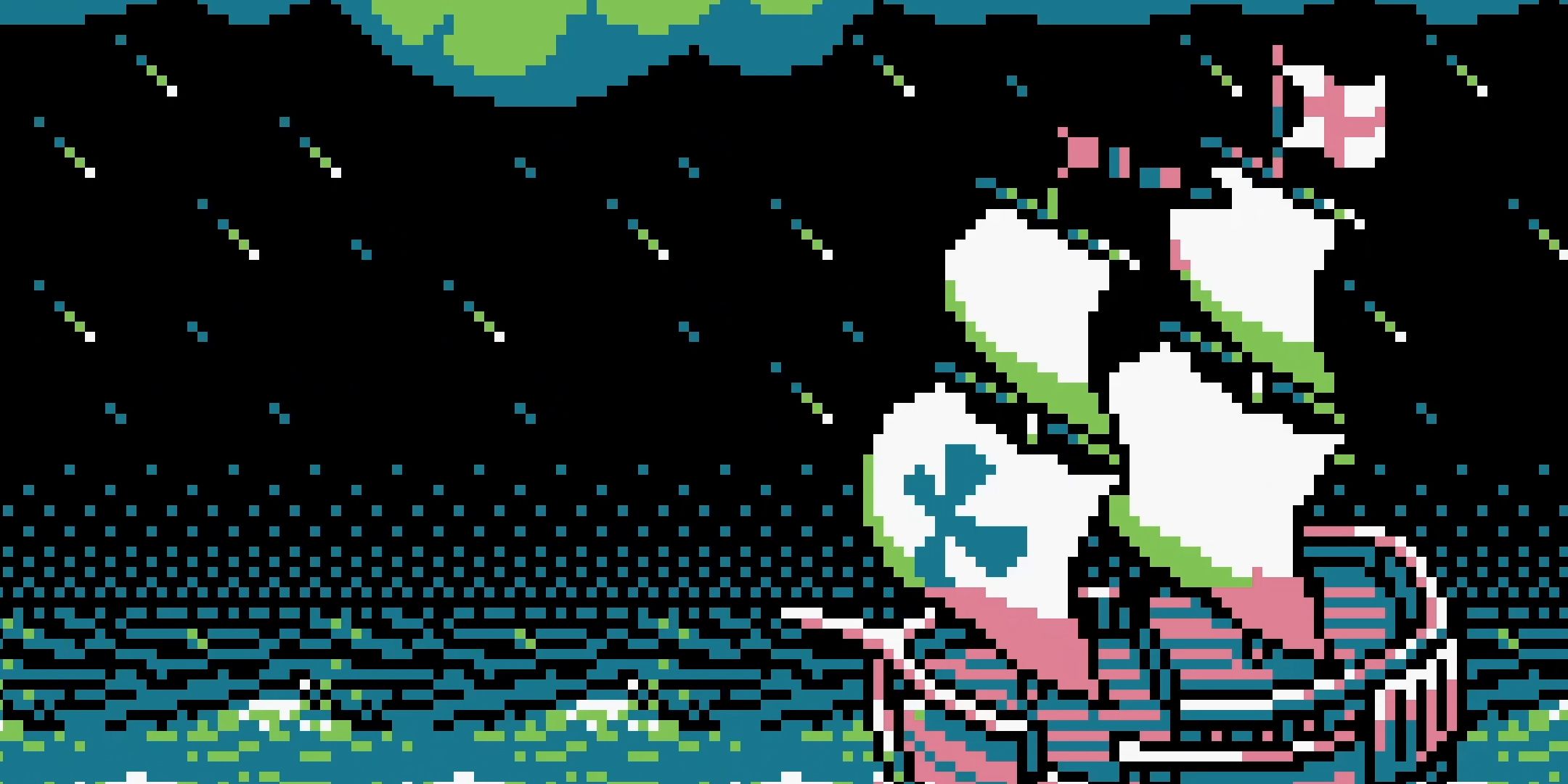
Related
Chantey Review: Stormy Seas Can’t Sink A Swashbuckling Rhythm Adventure
A battle of the bands on the high seas of the Caribbean is a great concept, and Chantey attacks it with enough gusto to make up for weaker moments.
Yes, there are no attack damage estimates, but I’ll willingly chalk that up to the QTE system, where pressing A on the beat increases damage or defense. Still, I won’t accept the fact that status effects – which the game dubs “FX” or “mods” – are so poorly color-coded, or the fact that your own pause menu does not define status icons in descriptions.
A click of the Y button opens a scattershot assortment of windows packed with items, gear, instruments, and a map. Fast-travel points are limited, and the map is poorly detailed, leaving certain side quests never completed simply because I was unable to find them again. Organizing which three pedals to equip is a cool feature, but they are couched in one of the most unintuitive interfaces I’ve seen all year.
A One-Man Band?
Instruments Work Well as RPG Weapons, But Fretless Needs More Character Overall
The music puns are constant in Fretless – The Wrath of Riffson, but never travel far beyond the valley of cringe. The icy mountain area features a “bass camp,” the tundra is defined as the “Tunedra,” there’s a “Dropdee Overlook,” and more eye-rolling titles. Enemy design and animation fare much better, with cowbell snails, amp spiders, xylophone lizards, and other musical chimeras. To deal with them, Rob employs an extensive gear cache of four different instruments or “axes,” comprising acoustic, bass, and electric guitars, as well as a synthesizer, all with their own bespoke spell/ability decks.

Related
If This Official Teaser Is What Fans Think It Is, We’re In For A Wild Pokémon Presents
Ahead of the Pokémon Presents show next week, the official Japanese Pokémon account has posted a teaser image, and the possibilities are pretty crazy.
You could sort of consider these character classes, and their individual strengths and weaknesses differentiate from each other nicely. And yet, I’m stumped by the inability to swap between them during combat, even if the game is generally easy to a fault. Since each card in a deck can be upgraded with limited resources, you’ll probably find yourself sticking to a preferred axe anyway; I ended up focusing on the synthesizer, which prioritizes buffs and debuffs to overwhelm enemies. Still, I never figured out why a game about a battle of the bands would center on one sole multi-instrumentalist.
Barely A Story, Barely A Song
Fretless Struggles With Its Musical/Mythic Identity
The story of Fretless – The Wrath of Riffson feels mostly like an afterthought, a weightless tale with touch-and-go NPCs who rarely maintain significance beyond a given area. Additionally, it all ends so abruptly after the final boss that I almost thought this itself some kind of bug, and there’s no new game+ or any such device to extend interaction with its world or mechanics (let alone multiple save states).
The game fares better soundtrack-wise but, much like its story, lacks a strong sense of character. Combat tunes are led by the instrument you wield, but they all feature noodling loops of music that never quite enter earworm territory, and fighting enemies whose BGM clashes with your own sounds messy most of the time. Also, it’s all purely instrumental, where lyrics and a singer could have helped articulate the game’s personality more effectively.
NPCs stand in place and rarely offer new dialogue, even amusingly ignoring plot developments. Even if the script is ultimately decent on its own, an endgame encounter where Rob is reintroduced to the faces from his journey underlines how ultimately forgettable the story is. It’s an embarrassing sequence meant to be a victory lap, but instead conjures only the vaguest recognition. “Oh, right, there’s that one guy from the second town, whoever he is.”
Fretless Is Short But Not Quite Sweet
It’s Hard to Solo Over this Backing Track
I completed Fretless – The Wrath of Riffson in seven hours with a fully upgraded synthesizer and all but two pedals collected. That’s probably just enough time for another game to establish an atmosphere, deliver a few good jokes, and set up a world worth returning to, but I can’t say that any of these objectives were met by the time Fretless’ credits rolled.
There’s a clear potential audience for this – fans of Rob Scanlon, fans of pixelated turn-based RPGS, fans of rhythm games – and I’d wager that none would feel adequately served by this fluffy and tedious diversion of a game. There’s even a late-stage area that suddenly introduces stealth mechanics and sends you back three or more loading screens upon discovery, which comes off as one final insult to injury.
The groundwork for a solid musical RPG is here, and the game’s combat contains the creative spark of something sticky and addictive, this combination of musical decks, FX, and rhythmic inputs. I’m restless after Fretless – The Wrath of Riffson, unclear about most of the game’s choices, like why it can’t even trigger a confirmation prompt before ending a turn during battle. I’d assume these basics are just a given, but sometimes a game reminds you of what we take for granted.
Screen Rant was provided with a digital PC code for the purpose of this review.
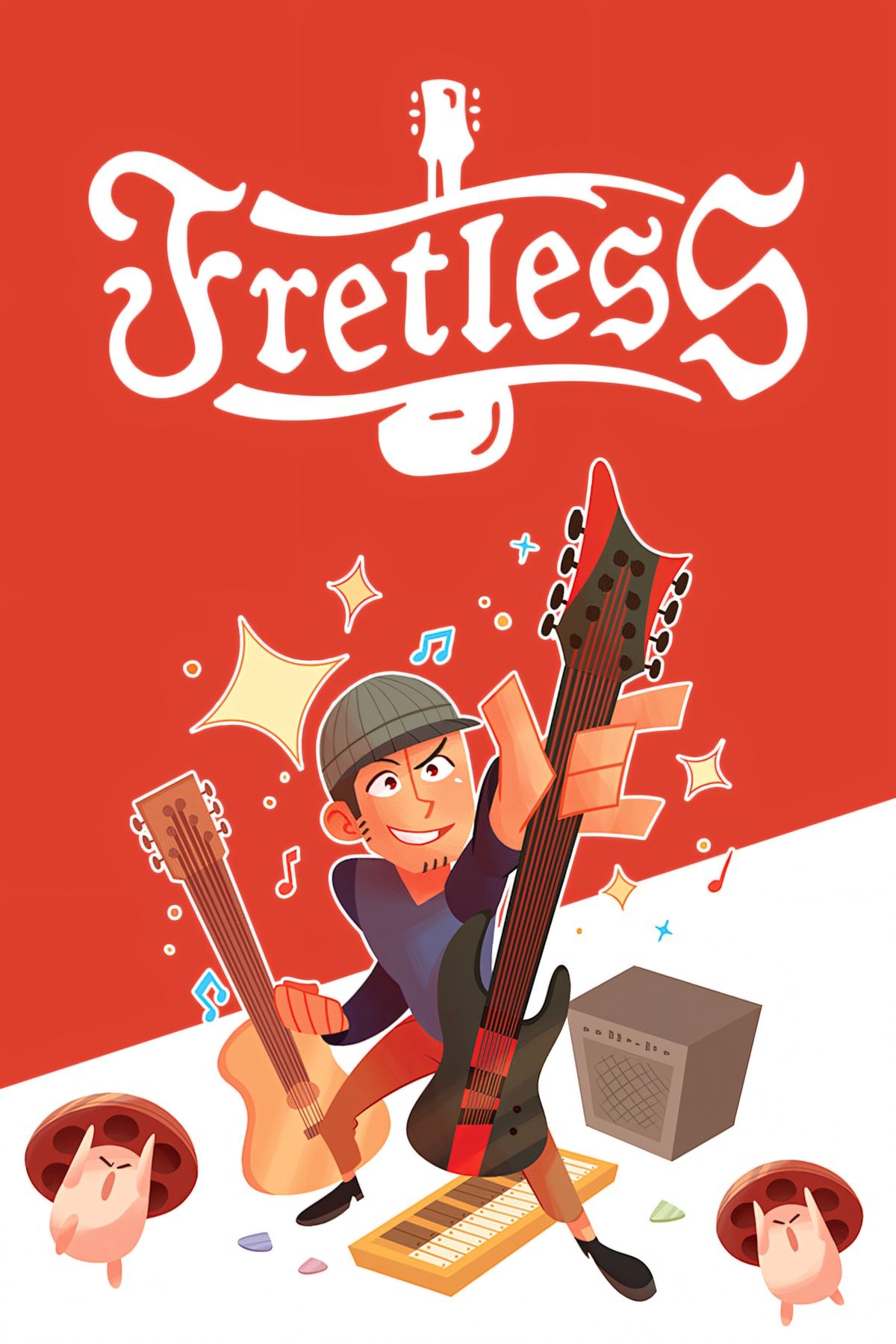
Fretless – The Wrath of Riffson
- Released
-
July 17, 2025
- Developer(s)
-
Ritual Studios
- Publisher(s)
-
Playdigious Originals
- Engine
-
Unity
- Number of Players
-
Single-player
- Attractive pixel art and animation
- Central concept of musical instruments and pedals as RPG weapons and relics is a good one
- Underdeveloped deckbuilding gameplay
- Weightless story that fails to lead anywhere interesting
- Poorly designed UI both in and out of combat
- Lacks depth in virtually every aspect
- Brief game time overall and little in the way of side content
This story originally appeared on Screenrant


